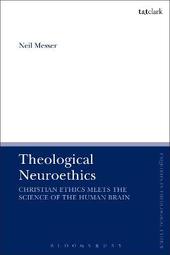
|
Theological Neuroethics: Christian Ethics Meets the Science of the Human Brain
Hardback
Main Details
| Title |
Theological Neuroethics: Christian Ethics Meets the Science of the Human Brain
|
| Authors and Contributors |
By (author) Dr Neil Messer
|
| Series | T&T Clark Enquiries in Theological Ethics |
|---|
| Physical Properties |
| Format:Hardback | | Pages:224 | | Dimensions(mm): Height 234,Width 156 |
|
| Category/Genre | Christian theology
Theology
Bio-ethics |
|---|
| ISBN/Barcode |
9780567671394
|
| Classifications | Dewey:241.642 |
|---|
| Audience | | Tertiary Education (US: College) | |
|---|
|
Publishing Details |
| Publisher |
Bloomsbury Publishing PLC
|
| Imprint |
T.& T.Clark Ltd
|
| Publication Date |
19 October 2017 |
| Publication Country |
United Kingdom
|
Description
Neil Messer brings together a range of theoretical and practical questions raised by current research on the human brain: questions about both the 'ethics of neuroscience' and the 'neuroscience of ethics'. While some of these are familiar to theologians, others have been more or less ignored hitherto, and the field of neuroethics as a whole has received little theological attention. Drawing on both theological ethics and the science-and-theology field, Messer discusses cognitive-scientific and neuroscientific studies of religion, arguing that they do not give grounds to dismiss theological perspectives on the human self. He examines a representative range of topics across the whole field of neuroethics, including consciousness, the self and the value of human life; the neuroscience of morality; determinism, freewill and moral responsibility; and the ethics of cognitive enhancement.
Author Biography
Neil Messer is Professor of Theology at the University of Winchester, UK.
ReviewsBy demonstrating ways that a theologian can bring rigorous, informed scholarship into meaningful discussion with neuroscientific research, Messer has opened the door for other theological perspectives... Messer's in-depth interdisciplinary dialogue is a summons to theologians to engage with neuroethics and to push the dialogue into areas beyond those discussed in his book. * Studies in Christian Ethics * Messer's excellent and approachable text does a comprehensive, thoughtful, and well-informed job of addressing a prominent and problematic gap: the absence of dialogue between theology and neuroethics. It could serve as an effective university text and would be engaging for anyone interested in bioethicists and neuroscience in general. * National Catholic Bioethics Quarterly * This book is a timely and much needed volume in neuroethics, where theological voices are mostly absent. Messer convincingly demonstrates how a theological exploration of neuroethical issues can benefit not only theology in its engagement with neuroscientific knowledge, but also neuroscience in the broadening of its epistemic horizons [...] He provides extensive analysis of current key issues arising in neuroscience and neurology, and offers a theological examination that could surprise many, especially those who might be skeptical about the contribution of theology to neuroethics. Those interested in neuroethics beyond the limited scope of its contemporary version will find this volume eye opening and unique in its merging of theology and brain science. Messer truly creates a path for Christian theology to meet the science of the human brain. * Fabrice Jotterand, Medical College of Wisconsin, USA * Neil Messer demonstrates that the meeting of neuroscience, theology and ethics has potential to be a creative encounter rather than a destructive collision. He engages in a pioneering exploration of territory which few theologians have previously visited, and he invites neuroscientists to visit his own theological territory in return. He shows us that theology has a contribution to make to thinking about neuroethics; for example, drawing on the parable of the Good Samaritan in illuminating our understanding of how to care for people with brain damage, and Augustine in shedding light on the nature of addiction, extending this to a consideration of the "addict in us all". His exploratory forays across disciplinary boundaries, and his offering of hospitality to those from other disciplines, go a long way to deepening mutual understanding between neuroscientists and theologians. * Christopher Cook, University of Durham, United Kingdom *
|